#a reason for writing
Explore tagged Tumblr posts
Text
wait do people read first person stories and think they're the ones in the story???
Saw people talking about not liking first person, which is fair, but their reasoning was like "I would not do that" and I don't understand that mindset.
First person stories are still about a character. A character making their own decisions. First person isn't about you???? At least I thought it wasn't. What am I missing? I've always seen first person as just a more in-depth look into a character's mind and stricter POV. Not as a reader stand-in.
#reading#writing#writblr#writeblr#isn't second person the one more likely to be projection#because it's involving you in the story#unless it's told in a more artistic way#like dislike a pov style if you want idc#I just don't understand this specific reason
59K notes
·
View notes
Text
As a writer I need everyone to know that whenever I write "exchanged glances" my intent is this

[ID: A screencap from The Penguins of Madagascar television series. It shows Skipper and Private in a cinderblock room with the head of a stuffed fish visible in the decor. Skipper is carrying a corked test tube of pink glowing liquid. Skipper glances at Private with a single raised eye brow. Private meets his eyes with a blanker expression of possibly raised eyebrows. End ID]
#penguins of madagascar#it's about time#funny#writing#personal misadventures#finally editing the o.g. with the image description. For reasons#described#edit just to be clear because people keep tagging with confusion: yes this is what the phrase means#I doubt anyone else’s automatic first thought is this specific scene though
73K notes
·
View notes
Text

i hate writing smut.
#3 of these i did actually google for writing reasons. the other 3 are for the bit#peer reviewed banger
24K notes
·
View notes
Text
Sometimes when doing writing research you find a little factoid that isn’t right for tormenting YOUR blorbos, but it is PERFECT for tormenting a friend’s blorbos so you just drop the fact on their doorstep like a demented little present.
14K notes
·
View notes
Text
not to sound like a boomer, but I need some people to learn how to write emails in a semi-professional (at the very least) format so you're not cold emailing a business/potential employer/any other stranger about formal matters in the exact same way you'd DM a close friend on instagram
the formality/language can loosen up in the email chain once you've established a rapport and you match the other person if they're being less formal, but please don't have the very first email you send a stranger be written in all lowercase ultra-casual sms slang with no greeting or signature and a billion emojis
#this sounds like a 'argh kids these days doing [insert exaggerated story they don't actually do in reality]' kind of thing#except that I've gotten soooo many emails like this#there's a reason that I don't have my DMs open on any socmed and it's bc they attract people getting way too casual/parasocial immediately#and forcing people to write out an email both filters out 90% of weird impulse messages and also throws them out of that casual headspace#except that I can actively tell when this fails and someone is treating emails as if they're the same thing as DMs
42K notes
·
View notes
Text
movie sonadow but its that awkward crush phase where sonic is just really dramatic about everything



#sonic the hedgehog#shadow the hedgehog#sonadow#shadic#sonic movie 3#sleepiiart#the song i made him sing is line without a hook by ricky montgomery i thought it fit because its so dramatic for no reason#i just took a screenshot of the lyrics because i didnt feel like writing all that lmao
12K notes
·
View notes
Text
more! | mlist ✎ᝰ.ᐟ

Just thinking about Ghost having a shy, quiet wife. The glaring opposite of Ghost, painted in black and blood while you’re adorned in lace and frills. Smooth skin and delicate flesh, warm eyes and a bashful smile. Soft-spoken and so fucking sweet.
No one else knows about you, or that he’s married, not from lack of wanting people to know he has such a pretty dove waiting for him at home, but because he knows all the men on base would eat you alive.
But one day, he forgets the lunch you made him. It takes everything in you to refrain yourself from driving to base to make sure he has something to eat— you know he doesn’t have the healthiest eating habits.
You choose to message him, something he usually responds fairly quickly to. Always at your beck and call just in case his sweet girl needs him, but he doesn’t answer. Your lips are pinched raw with worry by the time you decide to get in your car.
So, imagine everyone’s surprise when a sergeant interrupts the meeting Ghost’s in— ‘Lieutenant, um, Mrs. Riley is waiting outside for you.’
Ghost is on his feet in an instant, it must be some emergency if you’re there. He rushes to the hallway, everyone else in the room stumbling behind to snoop through the thin crack of the door, see who their big bad Lieutenant is married to.
And there you are, Tupperware container in your manicured hands, white dress covering your frame with matching ribbons and bows in your hair. The look on your face is anxious, right up until you see Ghost, your eyes softening as he approaches you with wide strides despite the fact that he’s twice your size, hulking and threatening.
“Sweet’art, everything okay? You’re not hurt, are you?” He asks, brows furrowing as he does a once over your figure, checking for injury.
You exhale a quiet laugh, “No, baby. You just forgot your lunch, and you didn’t answer your phone so I got worried you would go the whole day without eating.”
He cups your jaw, a smile breaking out on his face. His sergeants are baffled for several reasons— they did not expect their Lieutenant to be married to such a sweet thing, nor had they ever heard their Lieutenant speak in such a soft, hushed tone, never seen him touch something with such care, like you were so fragile in the palms of his hands.
They would’ve thought it was all a joke if it wasn’t for the massive diamond ring on your finger, or the way you pushed deeper into his touch.
“Sorry, dove, just been in a meetin’ all day.”
He stamps a kiss against your lips, lets himself linger just a little longer than he should because he knows the whole room is watching from behind the door.
“Sweetest little wife, aren’t you?”


#and then he almost kills a sergeant for flirting with you#or something like that#I know this trope has been overdone but it’s a good trope for a reason#softaestluv#cherris drabbles#cherri writes#call of duty#cod#simon ghost riley#simon ghost riley x you#simon ghost riley x reader#cod x reader#ghost x reader#soft simon riley
15K notes
·
View notes
Text
it's so sad that the innies think the outies have all this life and freedom that has been denied to them and meanwhile mark is a depressed alcoholic who lives only in dim lighting, helena cuts eggs in pieces so small the fork shouldn't be able to lift them to her mouth, dylan and gretchen's marriage is desintegrating, all irving has is black coffee and black paint and the black hole of vengeance that wants to swallow him whole... it's just so fucking sad they have the physical means to reach for and grasp all the happiness denied to the innies and they still can't. they're too damaged to. they've drawn a chalk circle of hell around themselves and they never step out of it. the innies' lust for life is the only thing that will help them break the cycle. we can't, we can't, i'm ready, we can't, i'm ready, i'm ready, i'm ready.
#writing this gave me chills for some fucking reason#severance#mark scout#helena eagan#irving bailiff#dylan g#irving b#helly r#mark s
9K notes
·
View notes
Text
I wish we had more female characters like Eleanor Shellstrop. One of the most unlikable people you've ever met. Read a Buzzfeed article on most rude things you can do on a daily basis and decided to use that as a list of goals. Makes everyone's day worse just by being there. Dropped a margarita mix on the ground and tried to pick it up, only to get hit by a row of shopping carts which pushed her into the road where she was hit by a boner pill delivery truck, killing her instantly. Cannot keep a romantic partner despite being bisexual. Had a terrible childhood but will die before she gets therapy. Best employee at a scam company. Just the worst but also can't help but root for her to improve.
Absolute loser. Girl-failure. Bad at almost everything. Literally perfect female character.
#eleanor shellstrop#you know i was thinking about how we hold female characters to such high standards#and severely criticize bitchy female characters while praising asshole male characters#and then i remembered eleanor and realized that she is the perfect example of how to write an asshole woman that the audience likes#the worse she is the more i'm drawn to her (and honestly same for tahani)#we need more cringe-fail women who nobody likes (for good reason)#the good place#female characters#writing women#girl failure#girl loser#she's so mean#i love her#my favorite#fucking asshole#iconic#the good place eleanor#tgp#tgp eleanor#kristen bell
77K notes
·
View notes
Text
my favorite scene in all of literature is when Neil Josten wakes up in Columbia after being drugged, hurls an alarm clock at Aaron, dumps his water on the floor and throws the cup at Aaron, stuff his clothes down the toilet and squeezes out through the window, has the foresight to call Matt from a pay phone to protect his shit, hitch hikes back to campus, eyes back to brown?? shows up on Wymack’s door like 😜 and reveals he could speak German the whole time?? CHARACTER OF ALL TIME, that is a protagonist who knows how MOVE THE MFING PLOT ALONG
#My dad always told me one of the most important things about writing#Is that your protagonist needs to be the one driving the plot lol#like Neil really mfing does that#He gets the plot moving and when it does it HAULS ASS#One of the most beautiful things about tfc#Is that Nora creates the most insane world and as a reader your like??😂 wtf#But then she writes a character who is perfectly suited to deal with that insane world#it’s so endlessly satisfying to read. All the characters speak other languages perfectly for some reason? No worries.#so does Neil. They like fight with knives and love to slam each other into walls? NO WORRIES#so does Neil#Bitch and he’s 5’3???? MY MAN#Novel of all time#protagonist of all time#Solidified its place in the canon of great literature#nora sakavic#all for the game#aftg#the foxhole court#tfc#neil josten
7K notes
·
View notes
Text
Expanding a thought from a conversation this morning:
In general, I think "Is X out-of-character?" is not a terribly useful question for a writer. It shuts down possibility, and interesting directions you could take a character.
A better question, I believe, is "What would it take for Character to do X?" What extremity would she find herself in, where X starts to look like a good idea? What loyalties or fears leave him with X as his only option? THAT'S where a potentially interesting story lies.
In practice, I find that you can often justify much more from a character than you initially dreamed you could: some of my best stories come from "What might drive Character to do [thing he would never do]?" As long as you make it clear to the reader what the hell pushed your character to this point, you've got the seed of a compelling story on your hands.
#writing#writing advice#my writing#I think 'ooc' is a bogeyman that casts too big a shadow for fanfic writers#stop thinking 'is this ooc?'#and start thinking 'have I given this character a good enough reason to do the thing?'
54K notes
·
View notes
Text
it’s hard for simon to focus on anything other than the way water glides down the expanse of your softened hips, your curves swaying with each move you make.
the man is literally drooling when you bend over to place your bar of soap back where it belongs, breasts bouncing, glistening in the lights of the bathroom when you straighten. residual soap drifts down your arms, legs, the top of your chest, down the planes of your round tummy.
and it’s when you turn that simon realizes you’ll be the death of him.
he knew this from the beginning of course, honeyed eyes watching the curl of your lips when you first graced him with your smile, the sun peaking out from behind the darkest of clouds.
but it’s now, you standing here swollen with his child, that he feels those rain clouds disperse. the final puzzle piece sliding into place.
you turned, eyebrows raised in question as simon looks down at you, his eyes mimicking that of a man starved.
“si? is everything alright?”
he was sure he looked like an idiot, smirking down at you in such a boyish way while he placed his hands at the dip of your hips, one hand snaking down to squeeze the plump of your ass. he was met with a squeak and a playful smack to his arm as you leaned into him, breasts flattening against his chest.
he didn’t mean for his voice to sound so full of hunger, but it was hard when you looked up at him under those fluttering lashes of yours.
“s’nothin’, mama. just thinkin’ ‘bout what i want for dinner tonight.”
#i always see pregnant!reader x ghost and i wanted to give it a try :)#although writing a pregnant reader has always been intimidating to me for some reason#anyway he could eat me for dinner just saying#call of duty#simon ghost riley#simon riley#call of duty modern warfare 2#cod#call of duty mwii#call of duty warzone#cod ghost#simon riley x reader#simon ghost riley x reader#simon riley x you#simon riley x female reader#simon ghost riley x you#simon ghost riley x female reader#ghost x reader#ghost x you#ghost x female reader#cod fanfic#ghost mw2#cod mw2#cod x reader#cod mwii#cod modern warfare#call of duty modern warfare#ghost cod#sirin writes⋆˚࿔
6K notes
·
View notes
Text
Batmobile Conversations as Heard by a Fast-food Drive Thru Cashier
Batman: "No."
Red Robin: "But what if -"
Batman: "No."
Red Robin: "But I could -"
Batman: "No."
Red Robin: "What if I -"
Robin: "Cease this Neanderthal behavior at once! You cannot be a Red if you are dressed entirely in Green!"
~*~*~
Red Hood: "You're not my fucking father!"
Batman: "The paperwork says otherwise."
Red Hood: "Fucking where, Bitch! I'll burn them!"
Batman: "You'd still be grounded and for even longer if you did."
~*~*~
Batman: "Please tell me you have a Signal action figure now?"
Drive Thru Cashier: "I'm afraid Riddler high jacked the truck they were supposed to be on. We haven't got any in yet."
Batmn: *long heavy sigh* " Of course he did."
~*~*~
Red Hood, driving the batmobile for some reason: "I need 10,000 of one of literally anything you carry other than the Night Wings. I literally don't carry what it is."
Signal: "And one order of Robin Nuggets."
Red Hood: "And one order of Robin Nuggets. We Are Robin limited edition version if you have it."
~*~*~
Nightwing, driving the batmobile for some reason: "I need 6 orders of Night Wings, please."
Red Robin: "There are only two of us? And I don't want Night Wings?"
Nightwing: "Nah, that just cause Hood's trying to steal my lead. I'll get you anything you want other than the Caped Crusader Sandwhich though."
~*~*~
Batman: "No, you may not borrow the Batmobile."
Robin: "It's a right of passage!"
Batman: "You are too young to have earned that right yet."
Spoiler: "Ha! He called you a baby!"
~*~*~
Spoiler, driving the batmobile for some reason: "Do you guys have any glitter?"
Drive Thru Cashier: "Ma'am, this is a fast food restaurant."
Spoiler:
Spoiler: "How many packets of ketchup, mustard, and mayonnaise can you legally give me?"
Drive Thru Cashier:
Drive Thru Cashier after checking with the manager: "50 packets of each."
Spoiler: "I'll take them!"
~*~*~
Robin, driving the batmobile clearly without permission: "I require 2 Robin Meals. One vegan."
Superboy the 2nd: "Oh! I want a Red Hood toy!"
Robin: "What?! Absolutely not! We will take the current Robin toy! A Nightwing if that's not available!"
Superboy the 2nd: "NOOO! I WANT RED HOOD!"
Red Hood, apparently in the back seat of the batmobile: "Dear God. MAKE IT 4 ROBIN MEALS, PLEASE, ANS GIVE THEM BOTH WHAT THEY WANT SO THEY SHUT UP."
Superboy the 2nd happily: "As long as I get my Red Hood."
Robin grumbling: "Ridiculous. Stop acting so thirsty for it."
Red Hood: *strangled, choking noises*
Superboy the 2nd: *mortified squeal* "ROBIN! That is NOT what that MEANS!"
#batman#jason todd#batfam#tim drake#batfamily#bruce wayne#dick grayson#damian wayne#stephanie brown#cassandra cain#jon kent#batmobile conversations#drive thru conversations#batfam drive thru adventures#13 reasons why not to be a gotham drive thru cashier#or 13 reasons why you should be one#Damian thinks thirsty is slang for longing for/wanting something#he's not technically wrong he just hasn't figured out that it only applies to a specifc context#jon just wants to finish his batfamily action figures collection#steph totally wanted materials to graffiti the batmobile with#i really really want riddler and signal to have a stupidly petty rivalry for no reason at all#i just love the idea so I'm pushing that agenda once more#jason is a good brother#everyone is tired of nightwing bragging about his Night Wings sales#cass is here in spirit#feel free to add on#RayneWolfeRune writes
4K notes
·
View notes
Text
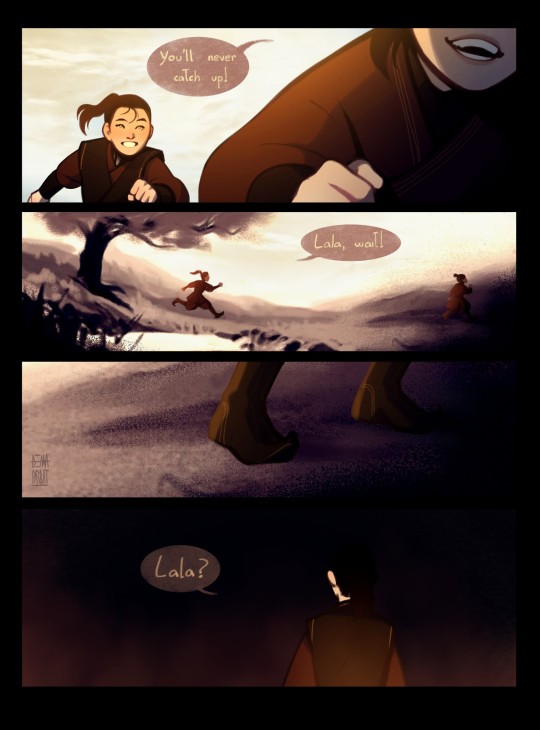




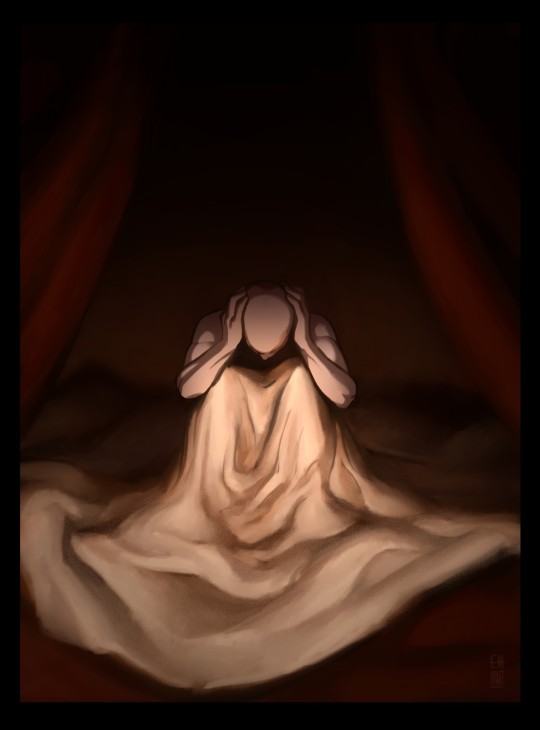
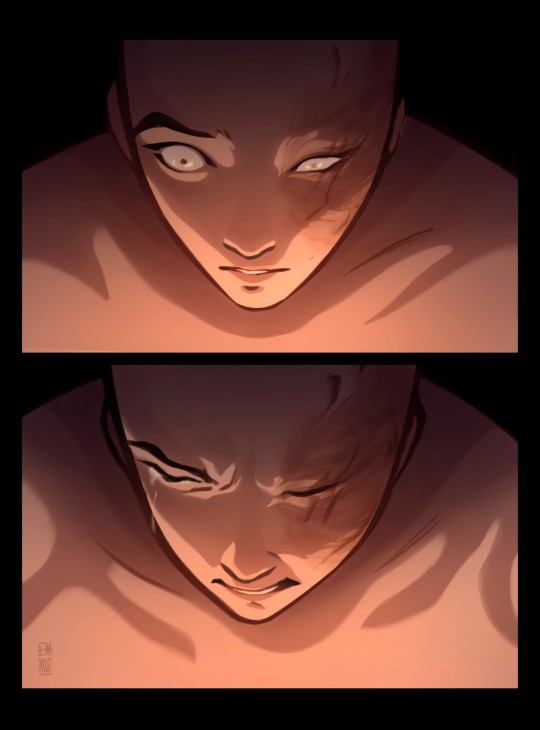

The Perfect Prince
#atla#zuko#avatar the last airbender#atla fanart#atla art#zuko fanart#zuko art#prince zuko#fire lord zuko#atla zuko#atla azula#princess azula#azula art#azula fanart#azula#ozai#fire lord ozai#agni#agni kai#The Perfect Prince#avatar#new gods au#Spirit Touched! Zuko#partially blind zuko#fire hazard siblings#fire nation#He's been having prophetic dreams for years#ponytail zuko#For some reason I couldn't draw his hair in this one. Phoenix Tail Zuko crew rise up!#This comic was such a ride to write and sketch. The progression of Zuko's nightmare was something that came out of nowhere.
15K notes
·
View notes
Text
Thinking about how in Gideon's narration she employs 206 anatomical names for bones but Harrow doesn't know the difference between a hilt and a pommel. Something something cavaliers being expected to respect/understand/integrate into necromancy while necromancers are not expected to do the same for caveliership. Is this anything.
#ik that idea is supported in the text plenty elsewhere but i was just thinking about language#someone (tiktok book reader) was complaining about gtn using 'too many big words'#and 1) i dont particularly remember any big words being used? at least nothing that i had to look up.#2) the big words that are used (anatomical names for bones) are important to the text and the character.#they help establish the world and gideons place in it.#its not like muir is just stuffing her prose with 'big' words for no good reason. shes very intentional with her writing.#this is not really a dig at anyone who thought there were big words in gtn (is that the general consensus?) it just got me thinking.#tlt#gtn#htn#the locked tomb
2K notes
·
View notes
Text
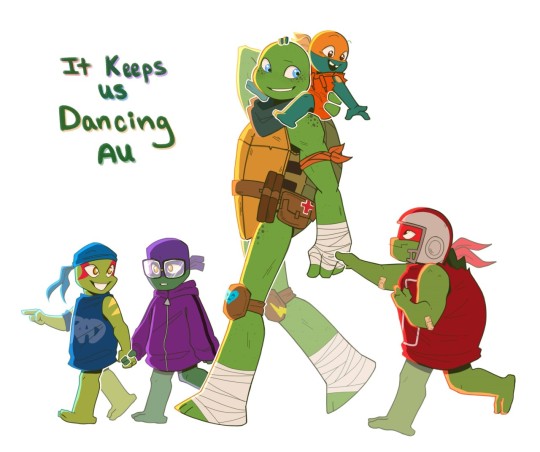
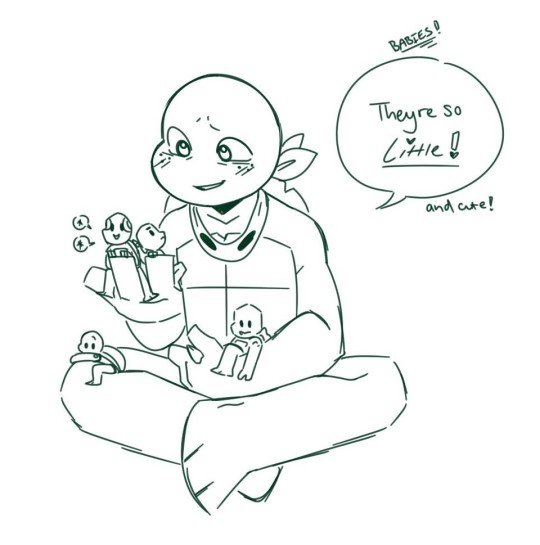
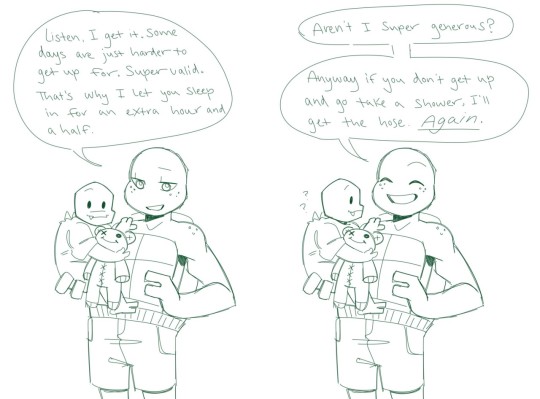
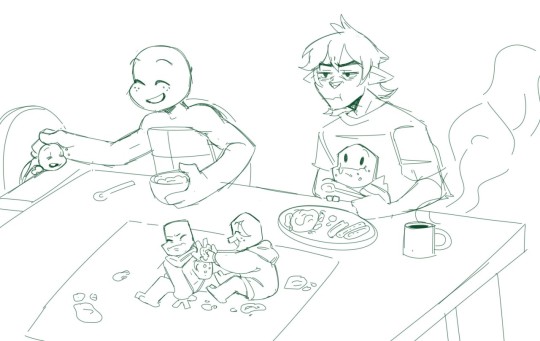

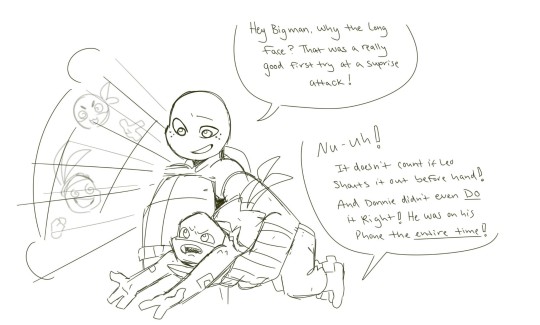
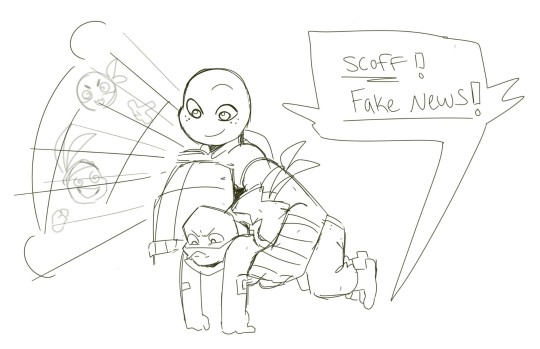
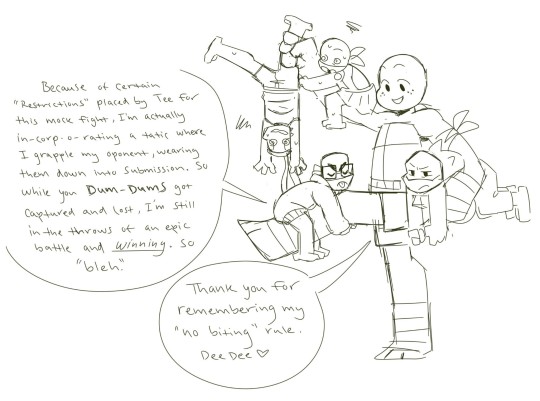
Something something 16yo 2k12 Mikey gets sucked into a portal and sent into the RISE universe and ends up helping raise the RISE kiddos AU
#my art#rottmnt#tmnt#rise of the tmnt#rise of the teenage mutant ninja turtles#rottmnt leo#rottmnt mikey#rottmnt donnie#rottmnt raph#tmnt mikey#tmnt 2012#rottmnt splinter#it keeps us dancing au#do i wanna talk about this au#i LOVE the idea that the reason why the rise boys are so funny and jovial and kind#is because 2k12 mikey had a hand in raising them#he kicks splinters butt into being a better parent#and also gives the boys a parental/big brother figure to look up to#and care for them#2k12 mikey would ADORE these babies so much#*holds your hands* listen to me very carefully#he would LOVE on these kiddos so much#and they would ADORE 2k12 mikey back#ohhh the fics i want to write#as soon as i have time its over for you all i am OBSESSED with this idea#they would call him TEE in this too#because i dont think 2k12 mikey would wanna be called mikey#since theres ALREADY a mikey here#and something something shouldnt mess with the different dimensions yada yada#IKUD AU
5K notes
·
View notes